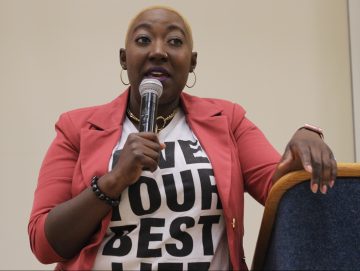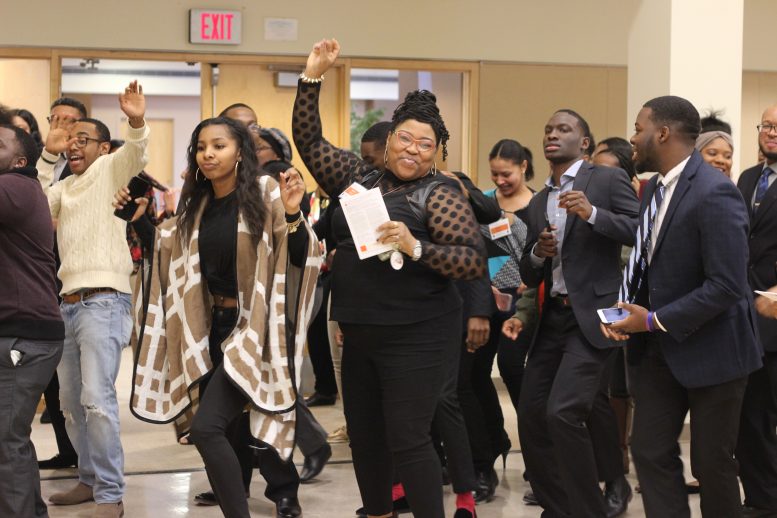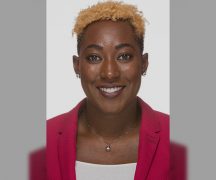By DAVID DUPONT
BG Independent News
Two weeks after PJ Jones arrived on the BGSU campus in 2005, her mother became critically ill.
Her mother died that November. Jones, addressing the recent Black Issues Conference on campus, said mentors and friends in the SMART Program worked so she could stay in school. They intervened with her professors. They attended her mother’s funeral with her. After some six changes in majors, Jones graduated with a degree in exercise science in 2010. Now as assistant director of multicultural and diversity affairs at the University of Florida, she’s in a position to help students.

PJ Jones
Back on her home campus, she urged students to reach inside of themselves to persist in the face of obstacles. It is difficult to be one of four or five blacks like “drops in a bowl of milk” in a large sociology lecture at a predominantly white university. But imagine, she said, being one of four or five blacks on the entire campus?
She wondered who the first African-Americans to attend BGSU were. She didn’t have the answer. Nor did any of the administrators in attendance. President Rodney Rogers said the question got him to thinking about these early Falcons’ identities.
These unnamed pioneers are among those whose labors made the presence of African-American students on campus possible.
“Your crown has already bought and paid for all you have to do is put it on your head,” Jones said.
Those who paid for the crown were those who protested, were arrested, or died in the struggle, and also those that carried the lists of medications and made sure everyone had water. Or photographers who documented the events. People who buffed floors and served meals. All should be remembered.
“My mother worked way too hard for me to be anything but great,” Jones said.
She said black students were all activists. “You being here at BGSU is an act of resistance” against “a society that would rather to put you in prison than give you a break, a society that wants to keep you on welfare and then shame you for being on welfare. …The universe has been orchestrated for you to be here at this point in time to realize your purpose.”
That means addressing first the issues they control. Oppression stands on two legs, the intractable institutional racism, and internalized oppression. If they can overcome the latter, oppression will tumble.
She told them they needed to draw on the power of ART.
She asked what the “A” in ART stood for. “Activism,” several students shouted.
Good guess, but no, said Jones. It stands for authenticity.
That means not giving “the world a watered down version of yourself.” Not changing tone of voice when talking to someone in the bursar’s office. Not toning down one’s sense of style by hiding tattoos or removing piercings for a job interview.
Jones said her grandmother would “think her crazy” for going to an interview with dyed hair and a nose ring.
“Find out who you really are, before other people started telling you who you are.”
Then she moved on to the “R.” Asked what that stood for, students responded “resilience.” Again, Jones threw them a curve. No, she said, the “R” stood for “retreat.”
Her mother died when she was just starting college. She knows what it is to be resilient. “I don’t want badge for it,” she said. “Life is hard enough as it is.”
She doesn’t need the burden of always being the “strong black woman.”
At work she can’t serve on every single committee to be the black voice. “You need to hire more black people.”
No, “sometimes you have to care for yourself. Self-care is a form of resistance,” she said quoting Audre Lord. They need to tend to their physical, spiritual, and mental health. “You don’t have to prove to anyone you belong here.”
The “T” stands for being thankful. She has spent time in Senegal, and experienced a world where the living conditions are far harder, where power outages are a daily occurrence. “It’s a whole new world when you have to put tablets to purify the water,” she said. It makes her more grateful to be able to go to a restaurant and eat food, and not worry.
How often, she asked, do you thank those who serve you the food? Or thank club advisors who stay late despite having to be up early because students have scheduled a night meeting?
Be thankful for every single second you are here, Jones said. “It’s going to be hard. … The universe doesn’t owe you a degree.”
Everything they need to claim their future comes from within. Remember, she said, “your crown is already bought and paid for.”



